A good friend of mine was looking the other day for a good recording of Brahms violin concerto. Although I know him quite well I am not sure yet what his musical taste is exactly. So, I had to think of a couple of great recordings among which I am pretty sure he will find his favorite. It is as usual a job with a certain degree of difficulty as there is no perfect version. However we are pretty lucky as is one of the fundamental concertos of the violin repertoire and all the great fiddlers had at least one take on it. I will resume to those that enlightened this great piece of musical architecture for me, and provided moments of discovery and revelation. I sure hope you will find among these one that speaks to your heart and mind in a very significant way. Let's meet them:
1. Nathan Milstein with Philharmonia Orchestra conducted by Anatole Fistoulari.
A very powerful performance. Milstein's glorious tone and unfailing musical intelligence serve this concerto to a spectacular performance that fills the room with energy and beautiful, big, romantic, self-confident geniality. A personal favorite, for the wealth of musical blossom, conducted by a remarkable intelligence, a complete authority over the instrument that becomes a voice of many voices that transposes you inside Brahms head making you part of his cortical activity.
2. Itzhak Perlman with Chicago Symphony Orchestra conducted by Carlo Maria Giulini.
An amazing lustrous performance. Perlman governs the proceeings with his glowing tone an forages the deepest corners of this music, while Giulini recreates an immense romantic landscape with superlative playing from the Chicagoans. A meeting of profound artists and a result that immerses you in an ocean of music and recreates in front of your eyes more of Brahms world than you could think possible.
3. David Oistrakh with French Radio Orchestra conducted by Otto Klemperer.
Another great recording. A meeting that promises the world and delivers more. Oistrakh plays with his usual involvement and profound musicianship. He lingers through the hidden corners of Brahms soul and breathes fire when he tells the world what he feels. Klemperer is right there providing his proverbial granit-like foundation for a romantic construction that is both svelte and powerful.
4. Jasha Heifetz with Chicago Symphony Orchestra conducted by Fritz Reiner.
An all American tour de force that just sweepes you of your feet. Jasha is at the height of his enormous powers and is one of the great examples of the kind of performances that made him the phenomenon fiddler of the last century. The concerto is closer to his sensibility than Beethoven's and such music comes shinning through an overwhelming display of dazzling technique. Again the Chicagoans provide a great support under the all-overseeing baton of Fritz Reiner. One of a kind.
5. Yehudi Menuhin with Lucerne festival Orchestra conducted by Wilhelm Furtwangler
A meeting of the titans somewhere halfway through the last century. Menuhin, already a mature, profound musician and Furtwangler the abyssal conductor that could recreate the worlds biggest works. They are overwhelming, going together, head to head beyond the music, into place where ideas live not bothered by anything. Music making from a different world that has to be heard to be believed. A must in every serious collection.
Classical Music Lists
As my other blog, Classical Music Review, doesn't allow secondary navigation, and as I promised that I would publish lists with what is valuable as recording for a certain group, here I am with this second blog. I hope your collection of recordings, and, of course, yourself will find this as a valuable resource.
Friday, September 18, 2009
Monday, October 09, 2006
Romanians and the World of Music
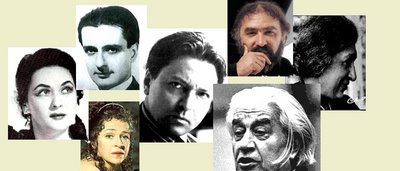
To start in recent history, ever since Puccini was writing Tosca for the Romanian soprano Hariclea Darclee, Romanians wrote glorious pages in the history book of music. This list will present some of the most influential and best represented in the recordings catalogue:
1. George Enescu
Any list about Romanian music and musicians has to start with its most illustrious figure. One of the most complex phenomena of the musical world from the dawn of the last century, Enescu left a profound mark on both the violin teaching and playing as well as composition. One of the great composers of the first half of the century, we own him a good deal of the great musicianship that Yehudi Menuhin managed to bring to the world. I will just mention two of his many achievements. First is the recording of te compelte Bach sonatas and partitaas for violin, which hold a legendary status. Anybody who thinks that heard and knew everything about these masterpieces should listen to Enescu. It's profundity and reachness of spiritual detail borders the miraculous.
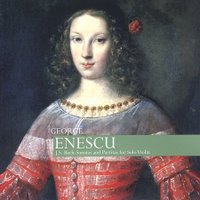
The second work I want to mention here is as close to a nation's soul as a musical piece could be. It is also the most performed of Enescu's compositions, although his symphonies and many of his other works see the red beans of the cd-players more and more often. The work I am talking about is the First Romanian Rapsody. Recently the great recording of Celibidache became available on dvd, and is by far the definitive recording. For a cd recording try Stokowski's version especially that now is available in the beautiful sound of the XRCD.
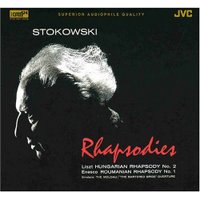
2. Dinu Lipatti
The pianist that reached the legend in just 33 years of life. Although his carrier was cut short by Hodgkin's disease his music-making was preserved in couple of recordings. Phenomenal technique put in the service of musical perfection. Considered by most one of the greatest of the 20th century, his recordings share the Reference status or count among the greatest recordings of the century. He is particularly noted for his interpretations of Mozart and Chopin, but he also made recordings of Franz Liszt, Enescu, Maurice Ravel's Alborada del Gracioso, the Schumann and Grieg piano concertos, and Johann Sebastian Bach. His recordings of the Schumann and Grieg concertos are widely considered to be among the finest ever made. His recording of Chopin's Waltzes has remained in print since its release and has long been a favorite of many classical music-lovers.

3. Sergiu Celibidache
Probably the best known figure from this illustruous list, Celibidace sits among the greatest battons of the last century. Controversial in many ways, Celibidache was capable of bringing to light the whole soul of a musical piece with elegance and extreme clarity. He made the Munich Philharmonic sound like one of the greatest orchestras. He was capable of expressing new things there where nothing seemed left to be discovered. Even for the well educated ear Celibidache's recordings are one rare treat, capable of bringing an entirely new vision of very-well known grounds.
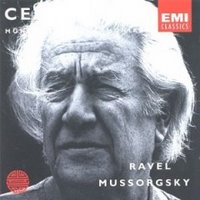
4. Clara Haskil
Few know that this celebrated Mozartian is Romanian. Although at her time many considered her the foremost interpreter of Mozart her recordings show also a superb interpreter of Beethoven, Schumann, and Scarlatti. She was a preferred partner for chamber music of such musicians as Enescu, Ysaye, Casals, or Grumiaux. Especially the period after the Second World War saw her name entering the pantheon of the great keyboard figures of the century and every recording she left us is a most convincing argument.
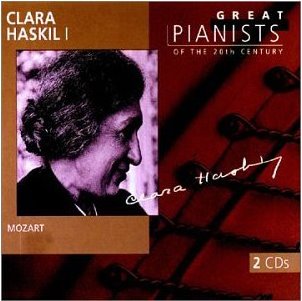
5. Radu Lupu
Contemporaneity finds us still at the keyboard, where we find one of the most creative and sensitive pianists of our times. I had the chance of seeing him live and it was a truly great experience. A very profound and lyrical interpreter of Schumann and Schubert, he is a suprisingly fresh and powerful Beethoven interpreter (his cycle with Mehta is a very good one), while in Mozart he provides a most beautiful account, deep, with a great sense of style and joyful creativity (his recording with Perahia of K. 365 concerto is one wonderful example).
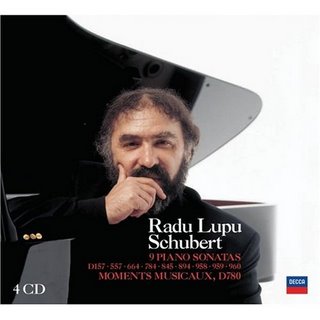
6. Virginia Zeani & Ileana Cotrubas
The Romanian Canto School provided outstanding generations of vocal talents. As I mentioned in the beginning starting probably with Hariclea Darclee great voices from that part of the world gave life to characters on the most important stages of the world. I picked just two from a very long list for their prominence in the history of bel canto and of operatic recordings.
Virginia Zeani was one of the most dominant sopranos of the the first half of last century. Playing alongside the gratest voices of her time starting with Beniamino Gigli and Ferruccio Tagliavini right up to Luciano Pavarotti and Plácido Domingo, you can listen to her voice on numerous "pirated" or live recordings. They show one of the most versatile and supremely gifted sopranos of the century.

Ileana Cotrubas was a prominent figure of the second half of the century operatic stage. Extremely versatile with an exceptionally good technique she was able to put her above average acting skills in practice in roles as diverse as Violeta in Traviata (her recording with Kleiber is a great classic) and Susanna in Le Nozze di Figaro.
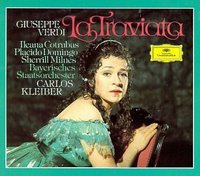
Saturday, March 04, 2006
Claudio Arrau's Legacy
Last century witnessed a truly phenomenal manifestation of piano talent. Amongst its peaks a special place is occupied by the great Chilean pianist Claudio Arrau. One of the most significant facts from his biography seems to me to be the direct relationship he established through his teacher in Berlin, Martin Krause, with the legacy of Franz Liszt and his music making technique and phylosophy. Another very important fact in my view is the seriousness and dedication to the original written score he showed consistently, and advocated for that matter, when it came to making music and trying to transmit through interpretation the whole world comprised in the great compositions. He is one of the few that I know that in order to understand and to play right Beethoven's piano sonatas he felt he has to know by heart and understand all the string quartets of the master of Bonn. Many things can be told significant for the musicianship of Arrau yet the best advocate is his recorded legacy that speaks about a great and profound musician in the most convincing way possible. Here are some picks:
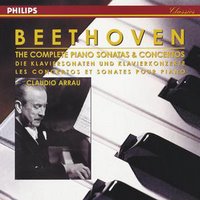 1. Beethoven's Piano Sonatas & Concertos
1. Beethoven's Piano Sonatas & Concertos
For me this is by far the best set with all Beethoven's sonatas. Even if there is a debate whether the first are "light" enough he is unbeatable in the middle and above all last sonatas.
For an even more "out of this world" redemption of the last three piano concertos please read this review.
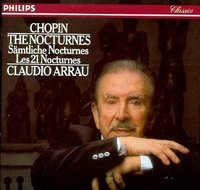 2. Chopin's Nocturnes
2. Chopin's Nocturnes
Nobody plays these profund pieces with the insight and dedication Arrau does. A genuine experience.
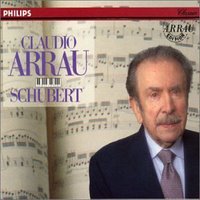 3. Schubert's Last Piano Sonatas
3. Schubert's Last Piano Sonatas
Schubert was a romantic genius and Arrau shows you in beautiful sound why is that.
 4. Liszt Piano Sonata in B minor
4. Liszt Piano Sonata in B minor
Tha grand sonata from Liszt by a pianist that inherited him both technically and spiritually. A one of kind version.
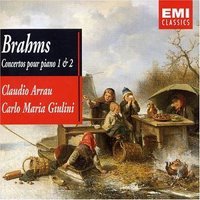 5. Brahms' First Piano Concerto
5. Brahms' First Piano Concerto
I prefer the version with Giulini. Intellectual power and emotional coherence. Read more here.
 6. Bach's Goldberg Variations
6. Bach's Goldberg Variations
Although Gould is an illustrious player of these variations I prefer Arrau deepest approach to this music.
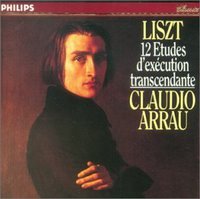 7. Liszt 12 Etudes d'execution transcedentale
7. Liszt 12 Etudes d'execution transcedentale
An unanimous acclaim as the finest version available.
 1. Beethoven's Piano Sonatas & Concertos
1. Beethoven's Piano Sonatas & ConcertosFor me this is by far the best set with all Beethoven's sonatas. Even if there is a debate whether the first are "light" enough he is unbeatable in the middle and above all last sonatas.
For an even more "out of this world" redemption of the last three piano concertos please read this review.
 2. Chopin's Nocturnes
2. Chopin's NocturnesNobody plays these profund pieces with the insight and dedication Arrau does. A genuine experience.
 3. Schubert's Last Piano Sonatas
3. Schubert's Last Piano SonatasSchubert was a romantic genius and Arrau shows you in beautiful sound why is that.
 4. Liszt Piano Sonata in B minor
4. Liszt Piano Sonata in B minorTha grand sonata from Liszt by a pianist that inherited him both technically and spiritually. A one of kind version.
 5. Brahms' First Piano Concerto
5. Brahms' First Piano ConcertoI prefer the version with Giulini. Intellectual power and emotional coherence. Read more here.
 6. Bach's Goldberg Variations
6. Bach's Goldberg VariationsAlthough Gould is an illustrious player of these variations I prefer Arrau deepest approach to this music.
 7. Liszt 12 Etudes d'execution transcedentale
7. Liszt 12 Etudes d'execution transcedentaleAn unanimous acclaim as the finest version available.
Wednesday, March 01, 2006
Mozart for those who hate Mozart
Mozart's musical output has been a permanent interest and almost every musician tried to approach some of his compositions during their careers. Unfortunately the recorded legacy shows clearly that Mozart's music is a very difficult thing to pull through as far as meaningful interpretation is concerned. The luxurious melodic content and the buoyancy of his spirit, obvious even in the slow movements made a good part of musicians play him, in Horowitz's words, "like Chopin". There are nonetheless achievements that make his genius manifest in full splendor. I gathered here some of them as they have in common two things: they are definitive versions and they are perls among Mozart's compositions. Even if you don't like Mozart you'll have to admit the beauty, the complexity of ideas and sentiments, the depth of his psychological insight all in perfect musical forms. If these guys don't convince you of Mozart's genius, nobody will.
1. Don Giovanni, K 527 - Gottlob Frick, Luigi Alva, Graziella Sciutti, Piero Cappuccilli, Joan Sutherland, Elisabeth Schwarzkopf, Eberhard Wachter, Heinrich Schmidt, Giuseppe Taddei / Carlo Maria Giulini
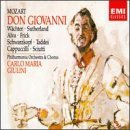 The greatest recording of the greatest of operas.
The greatest recording of the greatest of operas.
2. Le Nozze di Figaro, K 492 - Fiorenza Cossotto, Gillian Spencer, Anna Moffo, Elisabetta Fusco, Piero Cappuccilli, Ivo Vinco, Renato Ercolani, Elisabeth Schwarzkopf, Dora Gatta, Diana Gillingham, Eberhard Wachter, Heinrich Schmidt, Giuseppe Taddei / Carlo Maria Giulini
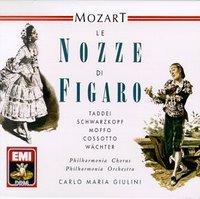 Another definitive recording from Giulini.
Another definitive recording from Giulini.
3. Cosi fan Tutte, K 588 - Christa Ludwig, Elisabeth Schwarzkopf, Hanny Steffek, Heinrich Schmidt, Alfredo Kraus, Giuseppe Taddei, Walter Berry / Karl Bohm
 Impecable cast, masterful conductor, indeed a great recording of the century.
Impecable cast, masterful conductor, indeed a great recording of the century.
4. Die Zauberflöte, K 620 - Gottlob Frick, Gundula Janowitz, Josephine Veasey, Gerhard Unger, Lucia Popp, Marga Hoffgen, Ruth-Margaret Putz, Christa Ludwig, Elisabeth Schwarzkopf, Franz Crass, Walter Berry, Nicolai Gedda, Agnes Giebel / Otto Klemperer
 You can't get better than this. The cast is stellar.
You can't get better than this. The cast is stellar.
5. Symphonies 35-41 - Berliner Philharmoniker, Karl Bohm
 The authority of the supreme Mozartian of the 20th century. Read an extended review here.
The authority of the supreme Mozartian of the 20th century. Read an extended review here.
6. Requiem - with William Warfield, Ingrid Seefried, Jennie Tourel, Leopold Simoneau / Bruno Walter
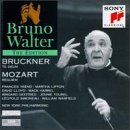 From the guy who reinvented Mozart, sorrow and silent dispair at heaven's doors.
From the guy who reinvented Mozart, sorrow and silent dispair at heaven's doors.
7. Paino Concerto No. 27, B flat major, K 595, Emil Gilels/Karl Bohm
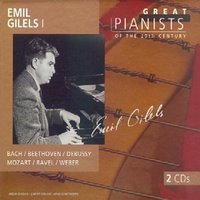 Not from a renowned Mozartian yet perfectly round in shape and emotion.
Not from a renowned Mozartian yet perfectly round in shape and emotion.
8. Violin Concertos - Arthur Grumiaux/ Sir Colin Davis/ Raymond Leppard
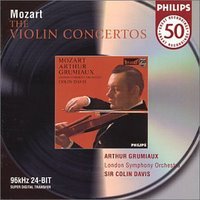 Impecable style, phrasing and expression. One of the greatest recordings with Mozart's music.
Impecable style, phrasing and expression. One of the greatest recordings with Mozart's music.
9. Piano Conerto No. 21, C Major, K. 467 - Dinu Lipatti / Herbert von Karajan
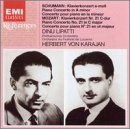 A glimpse into what started as a genuine piano genius. Karajan provides one of the best supports on disc.
A glimpse into what started as a genuine piano genius. Karajan provides one of the best supports on disc.
1. Don Giovanni, K 527 - Gottlob Frick, Luigi Alva, Graziella Sciutti, Piero Cappuccilli, Joan Sutherland, Elisabeth Schwarzkopf, Eberhard Wachter, Heinrich Schmidt, Giuseppe Taddei / Carlo Maria Giulini
 The greatest recording of the greatest of operas.
The greatest recording of the greatest of operas.2. Le Nozze di Figaro, K 492 - Fiorenza Cossotto, Gillian Spencer, Anna Moffo, Elisabetta Fusco, Piero Cappuccilli, Ivo Vinco, Renato Ercolani, Elisabeth Schwarzkopf, Dora Gatta, Diana Gillingham, Eberhard Wachter, Heinrich Schmidt, Giuseppe Taddei / Carlo Maria Giulini
 Another definitive recording from Giulini.
Another definitive recording from Giulini.3. Cosi fan Tutte, K 588 - Christa Ludwig, Elisabeth Schwarzkopf, Hanny Steffek, Heinrich Schmidt, Alfredo Kraus, Giuseppe Taddei, Walter Berry / Karl Bohm
 Impecable cast, masterful conductor, indeed a great recording of the century.
Impecable cast, masterful conductor, indeed a great recording of the century.4. Die Zauberflöte, K 620 - Gottlob Frick, Gundula Janowitz, Josephine Veasey, Gerhard Unger, Lucia Popp, Marga Hoffgen, Ruth-Margaret Putz, Christa Ludwig, Elisabeth Schwarzkopf, Franz Crass, Walter Berry, Nicolai Gedda, Agnes Giebel / Otto Klemperer
 You can't get better than this. The cast is stellar.
You can't get better than this. The cast is stellar.5. Symphonies 35-41 - Berliner Philharmoniker, Karl Bohm
 The authority of the supreme Mozartian of the 20th century. Read an extended review here.
The authority of the supreme Mozartian of the 20th century. Read an extended review here.6. Requiem - with William Warfield, Ingrid Seefried, Jennie Tourel, Leopold Simoneau / Bruno Walter
 From the guy who reinvented Mozart, sorrow and silent dispair at heaven's doors.
From the guy who reinvented Mozart, sorrow and silent dispair at heaven's doors.7. Paino Concerto No. 27, B flat major, K 595, Emil Gilels/Karl Bohm
 Not from a renowned Mozartian yet perfectly round in shape and emotion.
Not from a renowned Mozartian yet perfectly round in shape and emotion.8. Violin Concertos - Arthur Grumiaux/ Sir Colin Davis/ Raymond Leppard
 Impecable style, phrasing and expression. One of the greatest recordings with Mozart's music.
Impecable style, phrasing and expression. One of the greatest recordings with Mozart's music.9. Piano Conerto No. 21, C Major, K. 467 - Dinu Lipatti / Herbert von Karajan
 A glimpse into what started as a genuine piano genius. Karajan provides one of the best supports on disc.
A glimpse into what started as a genuine piano genius. Karajan provides one of the best supports on disc.
Tuesday, February 28, 2006
Definitive recordings
Some of the musical masterpieces have found interpretations that feel like definitive and without any room for further improvement. Here are some of these in my view:
1. Ludvig van Beethoven - Piano Concerto No.5, E Flat, Op. 73, Emperor - Edwin Fisher/Wilhelm Furtwangler
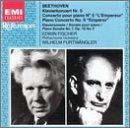
This is a piece of a miracle. Incredibile sound for a 78, best beethovenian conductor, an inspired pianist with an extremely responsive orchestra. The result an Emperor for which the right words aren't invented yet.
2. Ludvig van Beethoven - Symphonies Nos. 4&6 - Bruno Walter
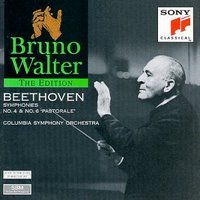
Walter's recording of Beethoven 6th is doomed to be unsurpassable while his 4th is still one of the best.
3. Ludvig van Beethoven - Symphony No. 9, D Minor, Op. 125 'Choral' - Wilhelm Furtwangler
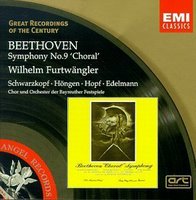 The symphony of the symphonies in the recording of the recordings.
The symphony of the symphonies in the recording of the recordings.
4. Johannes Brahms - Symphonies Nos. 2&3 - Bruno Walter
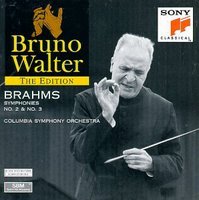 Walter seems to have had inside information on the making of these symphonies as he manages to reveal the core of Brahms feelings and intelect with utterly convincing power.
Walter seems to have had inside information on the making of these symphonies as he manages to reveal the core of Brahms feelings and intelect with utterly convincing power.
5. Hector Berlioz - Symphonie Fantastique, Op. 14 - Charles Munch
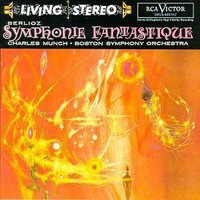 Munch is, without a shadow of a doubt, the owner of the most amazing version of this beautiful French symphony.
Munch is, without a shadow of a doubt, the owner of the most amazing version of this beautiful French symphony.
6. Wolfgang Amadeus Mozart - Don Giovanni, K 527 - Gottlob Frick, Luigi Alva, Graziella Sciutti, Piero Cappuccilli, Joan Sutherland, Elisabeth Schwarzkopf, Eberhard Wachter, Heinrich Schmidt, Giuseppe Taddei / Carlo Maria Giulini
 The ultimate Don from a conductor that knows the secrets of Music and has the ability to reveal them with a cast that is as close to perfect as possible.
The ultimate Don from a conductor that knows the secrets of Music and has the ability to reveal them with a cast that is as close to perfect as possible.
7. Giuseppe Verdi - Messa da Requiem - Christa Ludwig, Elisabeth Schwarzkopf, Nicolai Gedda, Nicolai Ghiaurov / Carlo Maria Giulini
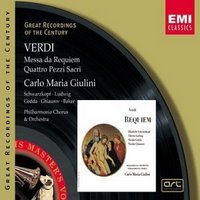 The undefineabe of the relationship between man and his Creator. See a full review here
The undefineabe of the relationship between man and his Creator. See a full review here
8. Robert Schumann - Symphony No. 4, D Minor, Op. 120 - Wilhelm Furtwangler
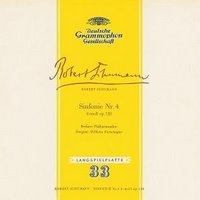 The emotional power, the fiery struggle and yet the flow and logic of a torrenting river. Unsurpassable.
The emotional power, the fiery struggle and yet the flow and logic of a torrenting river. Unsurpassable.
9. Ludvig van Beethoven - Violin Concerto, D, Op. 61 -Itzhak Perlman / Carlo Maria Giulini
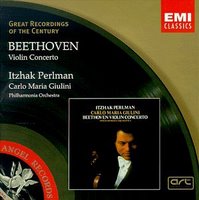 Hear a passionate and victorious spirit (Perlman) in a suffering and meditative body (Giulini).
Hear a passionate and victorious spirit (Perlman) in a suffering and meditative body (Giulini).
10. Ludvig van Beethoven - Piano Concertos Nos. 3,4 & 5 - Claudio Arrau / Otto Klemperer
 The ultimate Beethoven piano concertos in an unearthy class of their own which only Furtwangler Fisher partnership managed to reach before. See full review here.
The ultimate Beethoven piano concertos in an unearthy class of their own which only Furtwangler Fisher partnership managed to reach before. See full review here.
1. Ludvig van Beethoven - Piano Concerto No.5, E Flat, Op. 73, Emperor - Edwin Fisher/Wilhelm Furtwangler

This is a piece of a miracle. Incredibile sound for a 78, best beethovenian conductor, an inspired pianist with an extremely responsive orchestra. The result an Emperor for which the right words aren't invented yet.
2. Ludvig van Beethoven - Symphonies Nos. 4&6 - Bruno Walter

Walter's recording of Beethoven 6th is doomed to be unsurpassable while his 4th is still one of the best.
3. Ludvig van Beethoven - Symphony No. 9, D Minor, Op. 125 'Choral' - Wilhelm Furtwangler
 The symphony of the symphonies in the recording of the recordings.
The symphony of the symphonies in the recording of the recordings.4. Johannes Brahms - Symphonies Nos. 2&3 - Bruno Walter
 Walter seems to have had inside information on the making of these symphonies as he manages to reveal the core of Brahms feelings and intelect with utterly convincing power.
Walter seems to have had inside information on the making of these symphonies as he manages to reveal the core of Brahms feelings and intelect with utterly convincing power.5. Hector Berlioz - Symphonie Fantastique, Op. 14 - Charles Munch
 Munch is, without a shadow of a doubt, the owner of the most amazing version of this beautiful French symphony.
Munch is, without a shadow of a doubt, the owner of the most amazing version of this beautiful French symphony.6. Wolfgang Amadeus Mozart - Don Giovanni, K 527 - Gottlob Frick, Luigi Alva, Graziella Sciutti, Piero Cappuccilli, Joan Sutherland, Elisabeth Schwarzkopf, Eberhard Wachter, Heinrich Schmidt, Giuseppe Taddei / Carlo Maria Giulini
 The ultimate Don from a conductor that knows the secrets of Music and has the ability to reveal them with a cast that is as close to perfect as possible.
The ultimate Don from a conductor that knows the secrets of Music and has the ability to reveal them with a cast that is as close to perfect as possible.7. Giuseppe Verdi - Messa da Requiem - Christa Ludwig, Elisabeth Schwarzkopf, Nicolai Gedda, Nicolai Ghiaurov / Carlo Maria Giulini
 The undefineabe of the relationship between man and his Creator. See a full review here
The undefineabe of the relationship between man and his Creator. See a full review here8. Robert Schumann - Symphony No. 4, D Minor, Op. 120 - Wilhelm Furtwangler
 The emotional power, the fiery struggle and yet the flow and logic of a torrenting river. Unsurpassable.
The emotional power, the fiery struggle and yet the flow and logic of a torrenting river. Unsurpassable.9. Ludvig van Beethoven - Violin Concerto, D, Op. 61 -Itzhak Perlman / Carlo Maria Giulini
 Hear a passionate and victorious spirit (Perlman) in a suffering and meditative body (Giulini).
Hear a passionate and victorious spirit (Perlman) in a suffering and meditative body (Giulini).10. Ludvig van Beethoven - Piano Concertos Nos. 3,4 & 5 - Claudio Arrau / Otto Klemperer
 The ultimate Beethoven piano concertos in an unearthy class of their own which only Furtwangler Fisher partnership managed to reach before. See full review here.
The ultimate Beethoven piano concertos in an unearthy class of their own which only Furtwangler Fisher partnership managed to reach before. See full review here.
Monday, February 27, 2006
The greatest interpretations of Brahms symphonies
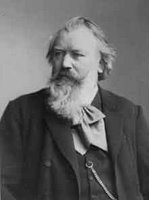
I was never able to set apart the music from the man in the case of Brahms. Everything I listen to has to sound like it's coming from the big warm heart and profound genius of the big man, cause he was a big man. I see his face a the end of his impressive stature and I can't imagine anything not being of gigantic dimensions. His laugh should be loud and sonorous, his joy could throw an entire city into celebrations, his sufferings and upsets should be like a fiery storm forming on top of a mountain, threating everything below. The symphonies themselves show a man that lived intensely and with an impressive richness of feelings and thoughts. And they take charge of his creative powers in a "winner takes all" kind of competition and sometimes two most dissonant ideas follow each other quite often at an amazing pace. It is no easy task to make this luxurious life come forward with logic and power. And yet, the last century saw some amazing achievements in this difficult task.
Symphony no. 1, C Minor, Op. 63
In my mind there are only two contestants in all 4 symphonies with some others worthy of mentioning for each symphony. As much as I would like to think only of Walter as THE Brahmsian conductor I couldn't possibly let aside Furtwangler. The two giants of last century are as different as you could possible imagine yet their results speak about the great man in the same exquisitely comprehensive manner. While Walter goes to the root of his heart Furtwangler drills deep into his mind. Yet both manage to express with amazing power, detail and command the portrait I desribed in the introduction. I prefer Walter as the interpret of the soul in its full expression but you have to listen to Furtwangler to see how feelings are formed in the brain. Both of them will grab you and immerse in the see of human struggle with its passions like no others. A very good version comes from Klemperer, a little more cerebral and not so inclined to abandon. If you would like to see how all these things form and mix with each other you have to listen to Celibidache's version as he's as usual able to throw light on the darkest corners of creation.
Symphony no. 2, D Major, Op. 73
In this symphony Walter has no competition. This pastoral symphony could have been composed for him. Everything is right and you can feel the internal strangth of the music pulsating and giving life to things. Furtwangler is again a good choice as well as Celibidache. Just take care that Celi's dissecting abilities aren't as rewarding this time, as you'd prefer the beauty of the whole and of the great lines.
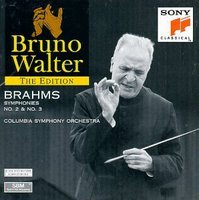
Symphony no. 3, F Major, Op. 90
The bearer of what is probably the most famous of Brahms' pieces, its third part (featured in the movie "Goodbye again") it's a very difficult one as you have less space and no particular predominent idea to guide you. It's telling without too much involvement what's happening in one man's head as he contemplates the view form his window, waiting for the sun to come up and try to make sense out of things. The guy is still Brahms so expect some strong feelins to emerge yet none of them leads to action and they die in the arms of the next one. Walter is again my favourite for this symphony, the third part is absolutely superb and overall, everything sounds so right. I wouldn't pick Furtwangler this time and if you want an alternative badly, then you might try Szell or Reiner.
Symphony no. 4, E Minor, Op. 98
The 4th symphony sounds like it knows is the last. Walter plays it almost the same way and a good part of the dynamics and the fluent energy that make the first three symphonies cornerstone versions, just lack here. It is still a go
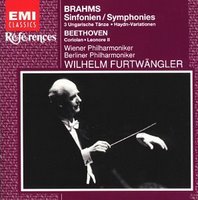 od account yet not on the same class as the others. Anyway, this is the moment where Furtwangler comes into play and takes this symphony at the height of Brahms' genius. His view is so romantic and of so larger than life dimensions that you have no chance left than to believe that this is one of the great symphonies of humankind. Also a good option here is Klemperer. This time his landmark granitic sound and cerebral approach does a lot of good and does a lot of justice to this great composition.
od account yet not on the same class as the others. Anyway, this is the moment where Furtwangler comes into play and takes this symphony at the height of Brahms' genius. His view is so romantic and of so larger than life dimensions that you have no chance left than to believe that this is one of the great symphonies of humankind. Also a good option here is Klemperer. This time his landmark granitic sound and cerebral approach does a lot of good and does a lot of justice to this great composition.To wrap up it is obvious by now that I would encourage everybody to have at least to sets of Brahms' symphonies. The one of Walter's from Sony and any of Furtwangler's two currently on the market. Of course there other places to go if you don't find these fullfilling yet keep them close to you as you owe it to yourself to hear what these guys have to say.
Saturday, February 25, 2006
Ideal cycle of Beethoven Symphonies

I open the listing with one of the centerpieces of my music world: the symphonies of Ludvig van Beethoven. As you probably already know there is no complete set from any conductor that could satisfy the 'supreme' measure, yet each symphony found supreme interpretations in one or more recordings. I will present my favorites here but be aware that I still have to listen to some of the 'famous' versions.

Symphony no. 1, C Major, Op. 21For this fresh and serious enthusiastic symphony I prefer Karajan in his '63 cycle (the best of his sets, as everybody agrees). The sound is great, the Berliners are in fabulous form and Karajan founds the best approach to it, getting it close to perfection (Bruno Walter is the alternative if you want to see a more mature and self-conscious teenager within this symphony).
Symphony no. 2, D-dur, Op. 36
Here again, Karajan is the best although I find Walter's added haviness and thoughtfulness much more appropriate than the in the first symphony and as a matter of fact I like his second part better. But overall, Karajan stays ahead with a unity of conception and of sound that is unsurpassed. You sure want to stay away from Klemperer who thinks much to seriously about this symphony than the bars bare it.
Symphony no. 3, E flat major, Op. 55, 'Eroica'
With this symphony we get to the cornerstone of Beethoven's symphonic cycle and to the most difficult of all, in terms of finding THE recording. However it found its master interpretation, in my opinion, in the hands of Bruno Walter. You'd prefer the Sony 20-bit mastering reissue for the better sound, yet no matter what the support the interpretation is the asolute Eroica. Close, but not close enough for me, come Klemperer, and, from a different angle, Bohm. We might want to listen to Giulini too, yet the desert island recording is that of Walter's, no doubt about it.
Symphony no. 4, D-dur, Op. 60
This is one symphony whete I have a real problem choosing between two versions. On one hand you have one of Furtwangler's versions, with the Berliners from 44, which at the time I first heard it was short of a miracle. I never believed that it can be played like that. The emotional intensity, the darkness of the opening and the gradual yet always intense exit from that darkness is something that you have to hear to believe. On the other hand there is Walter's redemption, the best for many, which is humanity itself with an unbreakable inner logic and beautiful phrasing and conception. I can't live without any of them.
Symphony no. 5, C, Op. 67
Undoubtedly the shiniest star of this wonderful galaxy in terms of popular acceptance, it is probably one the most difficult to get right. It's pretty straightforward as far as the message goes and it has to be extremely powerful without being screamy. That is why a 'conceptualist' like Klemperer doesn't get it quite right, making it too heavy. The three versions I have to pick all the time are: Furtwangler's 1944 version in Berlin, Karajan 63 version and the super-famous Kleiber version. It's hard to pick one yet I'd go first for Furtwangler because nobody else cand unravel what he can with such a diabolic power and insight. Close comes Kleiber and his incandescent yet highly ideatic redemption and in a close third Karajan, extremely powerful and intense with amazing playing from the Berliners. The fourth musketeer would be Walter who brings forward things missing elsewhere yet without the fire and the pure power that make this symphony what it is.
Symphony no. 6, F, Op. 68, 'Pastoral'
This is one with no dispute in my mind. There is no version that comes close to Walter's Columbia version. There
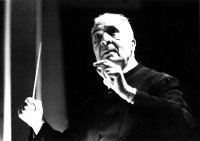 a lot of them that are beautiful and worth hearing (Bohm, Furtwangler, Klemperer) but none comes as close to perfect as Walter does. Is Dionissian in the absolute sense and all the fluids and energies of nature work together in the most wonderful way.
a lot of them that are beautiful and worth hearing (Bohm, Furtwangler, Klemperer) but none comes as close to perfect as Walter does. Is Dionissian in the absolute sense and all the fluids and energies of nature work together in the most wonderful way.Symphony no. 7, A, Op. 92
I'll go again for Walter, although Kleiber, Karajan, and Furtwangler cannot be left aside by any means. The reason is energy, marveleous connectivity between parts and a touch of darkness that makes the apotheotic dance in the end to be the most Beethovenian on record. It comes on the same cd with his equally great 4th so it's a treat.
Symphony no. 8, F, Op. 93
Two choices here with an unexpected third. First start from quite different premises yet the restults are most rewarding. Karajan takes 'classic' style and gives it Beethovenian proportions. With, again, a wonderful orchestra the result is so convincing that makes it a must choice. Walter has a more genteel manner and sees the Viennese heritage yet the result is beautifull. It's truly almost impossible to choose. An excellent version, smartly detailed comes from Ormandy. Backed up by beautiful strings it is a version definitely woth having.
Symphony no. 9, D, Op. 125
Here again I have no doubt for the favorite. Although debated with at least another reading from the same conductor, Furt
 wangler's Bayreuth version is for me The Ninth Symphony. The first time I have listened to it was scintillating. Everything made sense, all the 'thematic characters' were perfectly defined in a drama of larger than life proportions. You get immersed in the straggle of humanity with its own destiny in the most profound and revelatory way possible with a development that makes you think for a moment that you could've written the 'Ode to joy'. No other version manages to transcend the form and the content to another dimension. Furtwangler does this with ease and power, which I think it is his signature.
wangler's Bayreuth version is for me The Ninth Symphony. The first time I have listened to it was scintillating. Everything made sense, all the 'thematic characters' were perfectly defined in a drama of larger than life proportions. You get immersed in the straggle of humanity with its own destiny in the most profound and revelatory way possible with a development that makes you think for a moment that you could've written the 'Ode to joy'. No other version manages to transcend the form and the content to another dimension. Furtwangler does this with ease and power, which I think it is his signature.As you probably saw already if you make me recommend just one set I would probably go for Walter's, although Furtwangler's EMI set and Karajan's 1963 DG set would be up for considerations. If you want fabulous sound, or it is your first time you approach this music than you go for Karajan; if you think of Beethoven as the genius that had a fight with his destiny than I'd say Furtwangler, and if you think Beethoven is a man that understood more and loved humans for what they are and for what they are not than you better go for Bruno Walter. It's very unlikely you won't be satisfied.
Subscribe to:
Posts (Atom)




